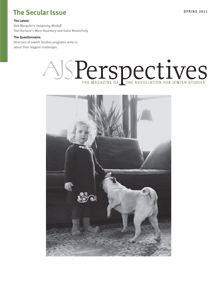Dear Colleagues,
The Jewish Studies program at the University of Maryland, my academic home, is hiring an assistant professor of Bible this year. Many extraordinary candidates have applied for the position, which was left vacant two years ago by the retirement of our great Bible scholar, Adele Berlin. The short-listed candidates have already visited campus, and they all gave deeply learned and intellectually exciting talks. At the moment I write, our search committee has not yet announced whom it will recommend for the position. This is therefore a good time for me to write about the place of the Bible in Jewish Studies. I have been thinking about the issue for a long time, and seeing the current crop of Bible scholars has only confirmed many of my long-held views about the field.
Let me begin by saying that I have always thought that the Bible was central to Jewish Studies. It seems absurd even to have to say what should be self-evident: The Bible is the creative expression of the ancient Israelites, from whom the Jews and Judaism descend. I know that some recent scholars have questioned that connection, and I respect their erudition, but I nevertheless have no doubt that the Bible and the history of the ancient Israelites is important for understanding all later Jewish experience. At least, later Jews have always thought so. I am delighted that learning about the Bible was part of my graduate training at Columbia. As graduate students in Jewish history, from ancient to modern, we all had to study Ancient Israel and include it as a field on our comprehensive exams. We weren't allowed to say the "biblical period" because you weren't supposed to name historical eras after books, but we were certainly responsible for knowing that period of Jewish history (even if it wasn't technically Jewish). I loved reading the works of the most important Bible scholars, and I am very glad that I mastered that field. It has served me well in my teaching, and it makes me a better scholar, even though my field is nineteenth-century, central European Jewish history.
I have also been long sharply critical of Jewish Studies programs that do not include the Bible as part of their curricula. Several years ago, I was an external reviewer for a very good Jewish Studies program, but I was horrified to see that this program offered no Bible and no rabbinics, or frankly, anything before the modern period. I complained forcefully in my report, telling the university that it must hire a Bible scholar. No respectable program in Jewish Studies could function without a person in that field, I insisted. Similarly at my own university, when Adele Berlin retired, I was afraid that the dean would delay replacing her in order to save money, and that we would go years without a Bible scholar. My colleagues and I protested loudly, and thankfully, the dean acquiesced, despite these economically stressful times. Let me note that in addition to all the other obvious benefits of teaching the Bible, courses in the Bible attract many students from diverse backgrounds, to the benefit of Jewish Studies as a whole.
Given my point of view, I was taken aback several years ago when I was AJS's vice president for program to learn that many Bible scholars think that the AJS conference is not hospitable to them. They worry that the conference is mostly for modernists—historians, literary critics, social scientists, scholars of Jewish thought and philosophy—and few people would even attend sessions on the Bible. Their worries become a self-fulfilling prophesy. Fearing lack of interest in Bible, few Bible scholars propose papers or sessions. As a result, there are only a few sessions devoted to the Bible at the annual meetings. Of course, Bible scholars have a conference of their own sponsored by the Society for Biblical Literature, and many prefer to give papers there rather than at the more general AJS conference. Still, as vice president for program, and now as president of AJS, I want the Bible to be an essential part of our annual conference. I urge Bible scholars to give papers at the AJS conference as well as the SBL. To be sure, Bible scholarship is not just a field within Jewish Studies. It is its own very worthwhile field, and part of the study of the ancient Near East, the history of Christianity, and religion generally. Still, it must remain part of Jewish Studies for its own well-being as well as for the benefit of Jewish Studies.
Recently I learned that the Jewish Studies program at the University of Oregon had decided to require its majors to study biblical Hebrew instead of modern Hebrew. The faculty had decided that biblical Hebrew was superior to modern Hebrew as a method of training students in the fundamentals of the Hebrew language. At first I was taken aback. My own Jewish Studies program requires our majors to take three years of modern Hebrew, and I firmly believe that it is essential for anyone in Jewish Studies to know modern Israeli Hebrew. Yet, the more I thought about it, the more I realized that requiring biblical Hebrew (although perhaps not in lieu of modern Hebrew) made sense. After all, such training would provide an excellent foundation for any other kind of Hebrew, and it would also enable students to read Jewish texts.
As I anxiously await the report of the subcommittee in our Bible search, one more issue comes to mind. Bible scholars demonstrate the way scholarship works. All of the job talks at Maryland were models of scholarly rigor and ingenuity. They revealed how patient philological analysis, careful attention to the structure and content of the text, and application of insights from other fields help us understand what a text means. Students who take Bible courses will learn how to read in a critical manner. Isn't that what a liberal education is all about?
Marsha Rozenblit
University of Maryland

